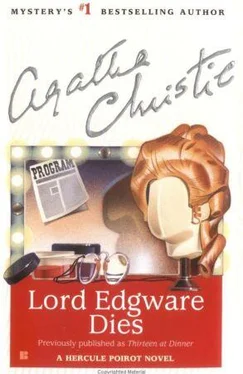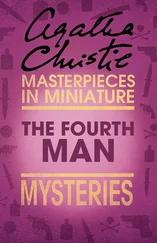Agatha Christie - Lord Edgware Dies
Здесь есть возможность читать онлайн «Agatha Christie - Lord Edgware Dies» весь текст электронной книги совершенно бесплатно (целиком полную версию без сокращений). В некоторых случаях можно слушать аудио, скачать через торрент в формате fb2 и присутствует краткое содержание. Год выпуска: 1986, ISBN: 1986, Издательство: Berkley, Жанр: Классический детектив, на английском языке. Описание произведения, (предисловие) а так же отзывы посетителей доступны на портале библиотеки ЛибКат.
- Название:Lord Edgware Dies
- Автор:
- Издательство:Berkley
- Жанр:
- Год:1986
- ISBN:ISBN-10: 042509961X
- Рейтинг книги:5 / 5. Голосов: 1
-
Избранное:Добавить в избранное
- Отзывы:
-
Ваша оценка:
- 100
- 1
- 2
- 3
- 4
- 5
Lord Edgware Dies: краткое содержание, описание и аннотация
Предлагаем к чтению аннотацию, описание, краткое содержание или предисловие (зависит от того, что написал сам автор книги «Lord Edgware Dies»). Если вы не нашли необходимую информацию о книге — напишите в комментариях, мы постараемся отыскать её.
Lord Edgware Dies — читать онлайн бесплатно полную книгу (весь текст) целиком
Ниже представлен текст книги, разбитый по страницам. Система сохранения места последней прочитанной страницы, позволяет с удобством читать онлайн бесплатно книгу «Lord Edgware Dies», без необходимости каждый раз заново искать на чём Вы остановились. Поставьте закладку, и сможете в любой момент перейти на страницу, на которой закончили чтение.
Интервал:
Закладка:
‘Now for the third crime. It is at a luncheon party. Sir Montagu Corner makes a reference to a conversation he had with Lady Edgware on the night of the murder. That is easy. But Nemesis comes upon her later. There is a mention of the “judgement of Paris” and she takes Paris to be the only Paris she knows – the Paris of fashion and frills!
‘But opposite her is sitting a young man who was at the dinner at Chiswick – a young man who heard the Lady Edgware of that night discussing Homer and Greek civilization generally. Carlotta Adams was a cultured well-read girl. He cannot understand. He stares. And suddenly it comes to him.This is not the same woman. He is terribly upset. He is not sure of himself. He must have advice. He thinks of me. He speaks to Hastings.
‘But the lady overheard him. She is quick enough and shrewd enough to realize that in some way or other she has given herself away. She heard Hastings say that I will not be in till five. At twenty to five she goes to Ross’s maisonette. He opens the door, is very surprised to see her, but it does not occur to him to be afraid. A strong able-bodied young man is not afraid of a woman. He goes with her into the dining-room. She pours out some story to him. Perhaps she goes on her knees and flings her arms around his neck. And then, swift and sure, she strikes – as before. Perhaps he gives a choked cry – no more. He, too, is silenced.’
There was a silence. Then Japp spoke hoarsely.
‘You mean – she did it all the time?’
Poirot bowed his head.
‘But why, if he was willing to give her a divorce?’
‘Because the Duke of Merton is a pillar of the Anglo-Catholics. Because he would not dream of marrying a woman whose husband was alive. He is a young man of fanatical principles. As a widow, she was pretty certain to be able to marry him. Doubtless she had tentatively suggested divorce, but he had not risen to the bait.’
‘Then why send you to Lord Edgware?’
‘Ah! parbleu!’ Poirot, from having been very correct and English, suddenly relapsed into his natural self. ‘To pull the cotton-wool over my eyes! To make me a witness to the fact that there was not motive for the murder! Yes, she dared to make me, Hercule Poirot, her cat’s paw! Ma foi, she succeeded, too! Oh, that strange brain, childlike and cunning. She can act! How well she acted surprise at being told of the letter her husband had written her which she swore she had never received. Did she feel the slightest pang of remorse for any of her three crimes? I can swear she did not.’
‘I told you what she was like,’ cried Bryan Martin.
‘I told you. I knew she was going to kill him. I felt it. And I was afraid that somehow she’d get away with it. She’s clever-devilish clever in a kind of half-wit way. And I wanted her to suffer. I wanted her to suffer. I wanted her to hang for it.’
His face was scarlet. His voice came thickly.
‘Now, now,’ said Jenny Driver.
She spoke exactly as I have heard nursemaids speak to a small child in the park.
‘And the gold box with the initial D, and Paris November inside?’ said Japp.
‘She ordered that by letter and sent Ellis, her maid, to fetch it. Naturally Ellis just called for a parcel which she paid for. She had no idea what was inside. Also, Lady Edgware borrowed a pair of Ellis’s pince-nez to help in the Van Dusen impersonation. She forgot about them and left them in Carlotta Adams’ handbag – her one mistake.
‘Oh! it came to me – it all came to me as I stood in the middle of the road. It was not polite what the bus driver said to me, but it was worth it. Ellis! Ellis’s pince-nez. Ellis calling for the box in Paris. Ellis and therefore Jane Wilkinson. Very possibly she borrowed something else from Ellis besides des pince-nez.’
‘What?’
‘A corn knife…’
I shivered.
There was a momentary silence.
Then Japp said with a strange reliance in the answer.
‘M. Poirot. Is this true?’
‘It is true, mon ami.’
Then Bryan Martin spoke, and his words were, I thought, very typical of him.
‘But look here,’ he said peevishly. ‘What about me? Why bring me here today? Why nearly frighten me to death?’
Poirot looked at him coldly.
‘To punish you, Monsieur, for being impertinent! How dare you try and make the games with Hercule Poirot?’
And then Jenny Driver laughed. She laughed and laughed.
‘Serve you right, Bryan,’ she said at last.
She turned to Poirot.
‘I’m glad as I can be that it wasn’t Ronnie Marsh,’ she said. ‘I’ve always liked him. And I’m glad, glad, glad that Carlotta’s death won’t go unpunished! As for Bryan here, well I’ll tell you something, M. Poirot. I’m going to marry him. And if he thinks he can get divorced and married every two or three years in the approved Hollywood fashion, well, he never made a bigger mistake in his life. He’s going to marry and stick to me.’
Poirot looked at her – looked at her determined chin – and at her flaming hair.
‘It is very possible, Mademoiselle,’ he said, ‘that that may be so. I said that you had sufficient nerve for anything. Even to marry a film “star”.’
Chapter 31. A Human Document
A day or two after that I was suddenly recalled to the Argentine. So it happened that I never saw Jane Wilkinson again and only read in the paper of her trial and condemnation. Unexpectedly, at least unexpectedly to me, she went completely to pieces when charged with the truth. So long as she was able to be proud of her cleverness and act her part she made no mistakes, but once her self-confidence failed her, owing to someone having found her out, she was as incapable as a child would be of keeping up a deception. Cross-examined, she went completely to pieces.
So, as I said before, that luncheon party was the last time I saw Jane Wilkinson. But when I think of her, I always see her the same way – standing in her room at the Savoy trying on expensive black clothes with a serious absorbed face. I am convinced that that was no pose. She was being completely natural. Her plan had succeeded and therefore she had no further qualms and doubts. Neither do I think that she ever suffered one pang of remorse for the three crimes she had committed.
I reproduce here a document which she had directed was to be sent to Poirot after her death. It is, I think, typical of that very lovely and completely conscienceless lady.
Dear M. Poirot, I have been thinking things over and I feel that I should like to write this for you. I know that you sometimes publish reports of your cases. I don’t really think that you’ve ever published a document by the person themselves. I feel, too, that I would like everyone to know just exactly how I did it all. I still think it was all very well planned. If it hadn’t been for you everything would have been quite all right. I’ve felt rather bitter about that, but I suppose you couldn’t help it. I’m sure, if I send you this, you’ll give it plenty of prominence. You will, won’t you? I should like to be remembered. And I do think I am really a unique person. Everybody here seems to think so.
It began in America when I got to know Merton. I saw at once that if only I were a widow he would marry me. Unfortunately, he has got a queer sort of prejudice against divorce. I tried to overcome it but it was no good, and I had to be careful, because he was a very kinky sort of person.
I soon realized that my husband simply had got to die, but I didn’t know how to set about it. You can imagine things like that ever so much better in the States. I thought and I thought – but I couldn’t see how to arrange it. And then, suddenly, I saw Carlotta Adams do her imitation of me and at once I began to see a way. With her help I could get an alibi. That same evening I saw you, and it suddenly struck me that it would be a good idea to send you to my husband to ask him for a divorce. At the same time I would go about talking of killing my husband, because I’ve always noticed that if you speak the truth in a rather silly way nobody believes you. I’ve often done it over contracts. And it’s also a good thing to seem stupider than you are. At my second meeting with Carlotta Adams I broached the idea. I said it was a bet, and she fell for it at once. She was to pretend to be me at some party and if she got away with it she was to have ten thousand dollars. She was very enthusiastic and several of the ideas were hers – about changing clothes and all that. You see, we couldn’t do it here because of Ellis and we couldn’t do it at her place because of her maid. She, of course, didn’t see why we couldn’t. It was a little awkward. I just said ‘No.’ She thought me a little stupid about it, but she gave in and we thought of the hotel plan. I took a pair of Ellis’s pince-nez.
Читать дальшеИнтервал:
Закладка:
Похожие книги на «Lord Edgware Dies»
Представляем Вашему вниманию похожие книги на «Lord Edgware Dies» списком для выбора. Мы отобрали схожую по названию и смыслу литературу в надежде предоставить читателям больше вариантов отыскать новые, интересные, ещё непрочитанные произведения.
Обсуждение, отзывы о книге «Lord Edgware Dies» и просто собственные мнения читателей. Оставьте ваши комментарии, напишите, что Вы думаете о произведении, его смысле или главных героях. Укажите что конкретно понравилось, а что нет, и почему Вы так считаете.












